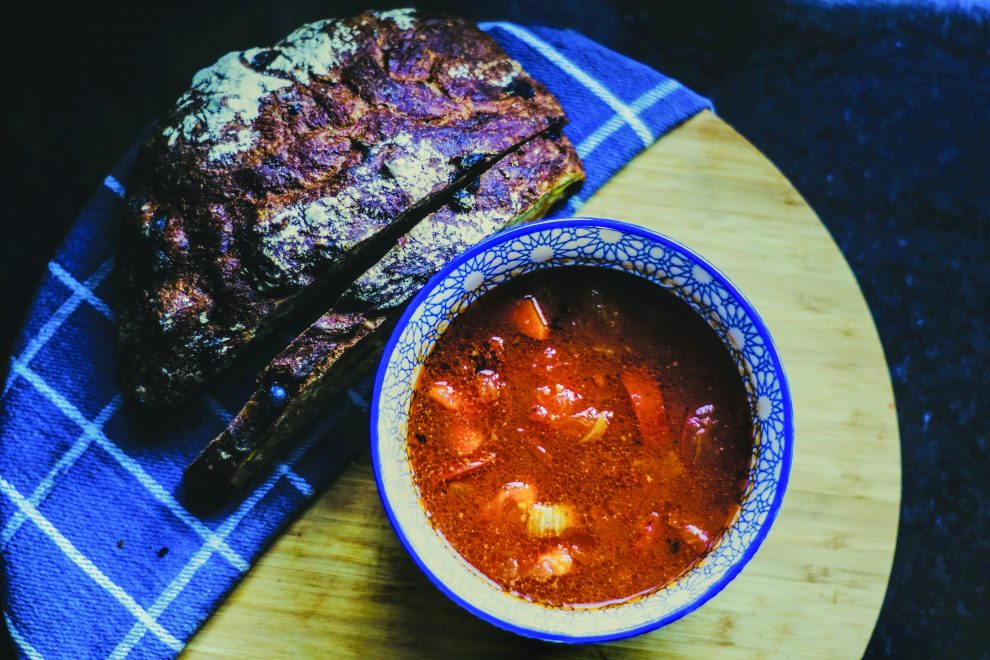I never imagined Eucharist could smell like beef stew—until it did.
Church bells toll across campus. Each gong sings through the early evening air with conviction. “Stop what you’re doing!” they proclaim. “It’s time to gather and celebrate!”
I used to drop everything at the bell toll. Back when I could nestle my weary body into a wooden choir stall. Back when I could feel the organ prelude vibrating through my chest. Back when we savored bread and sipped wine together. Before the pandemic and before churches closed to the public. Before liturgy became livestreamed.
The pandemic stole those days. It did not steal communion.
I park my car in front of the refectory loading dock just west of the church. The bells continue their commanding toll as a cafeteria worker lowers a box of M&M bags into my arms. I set the box on the back seat and retrieve the worker’s other offerings: boxes filled with pasta salad and beef stew.
“Headed to the hotel?” a monk asks as he walks by.
“You betcha,” I respond in a classic Minnesotan drawl. “Off to celebrate some kind of Eucharist.”
“Same,” he says, eyes grinning above his mask.
I buckle into my Camry-turned-choir stall. On the dashboard sits a list of room numbers and dietary needs for the 28 unhoused people staying at the hotel just a few miles away.
The pandemic stole in-person worship. It did not steal communion.
COVID-19 leaves unhoused folks from across the county particularly vulnerable, so the local Catholic Worker community and other neighbors secured a block of hotel rooms for the foreseeable future. Area restaurants, a women’s monastery, and the Catholic university where I work provide meals. When they needed someone to deliver meals on Tuesdays and Thursdays, I volunteered, eager to experience church in a new way during the pandemic.
It’s a money- and labor-intensive endeavor, one that highlights this country’s ever-growing housing crisis. How long, O Lord, will so many people live without homes? What will it take for local, state, and national government officials to prioritize care for the most vulnerable?
These questions rise like psalms of lament as I turn the key in the ignition. The systemic issues need attention.
But right now, communion is getting cold.
The bells wrap up their song as I back away from the loading dock. Muscle memory kicks in. My hand approaches my forehead for the sign of the cross as if I too were beginning Mass right now. In some ways it feels like I am. My next half hour will not include Glorias or Alleluias, but it will surely include the body of Christ.
Christ makes all things holy—even beef stew.
Advertisement
I head toward the hotel. Toward church in all its stripped-down glory.
You are indeed Holy, O Lord,
and all you have created
rightly gives you praise.
As I pull up to the hotel, a litany of praise pours forth from my mind for the first time since COVID-19 knocked our world—and our worship—upside down.
Praise be for full back seats.
Praise be for smells of home.
Praise be for neighbors meeting neighbors.
Praise be for shared dinners.
Praise be for new rituals.
Praise be for Eucharist in many forms.
For through your Son, our Lord Jesus Christ,
by the power and working of the Holy Spirit,
you give life to all things and make them holy.
Christ makes all things holy—even beef stew.
This article also appears in the November issue of U.S. Catholic (Vol. 85, No. 11, page 7). Click here to subscribe to the magazine.
Image: Unsplash/Sven Brandsma













Add comment